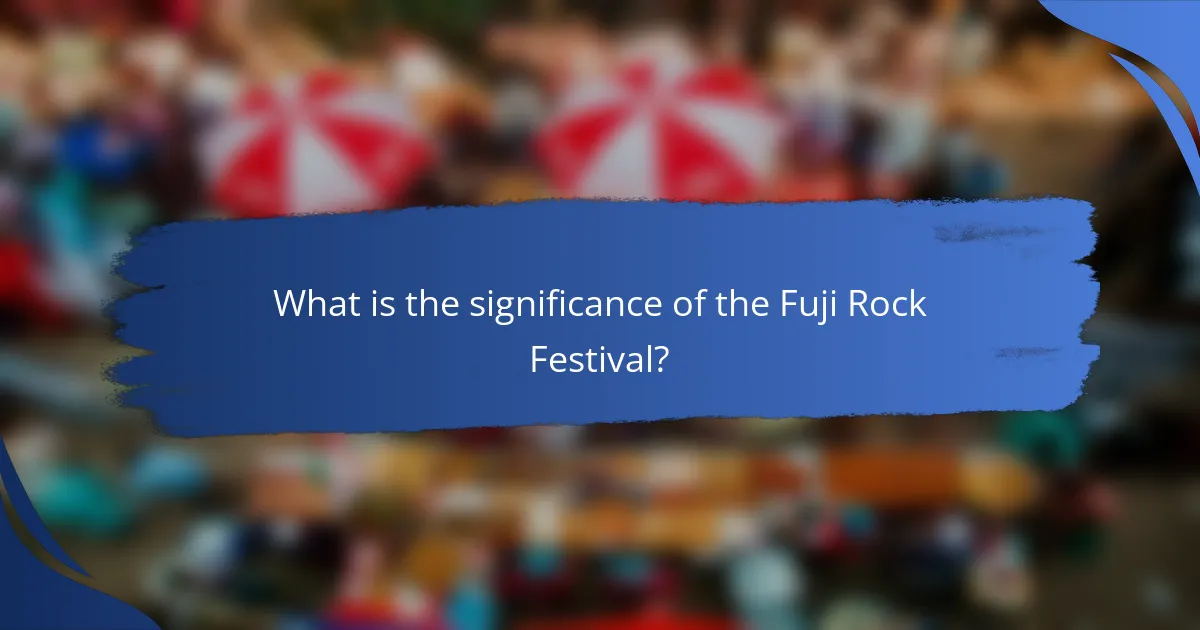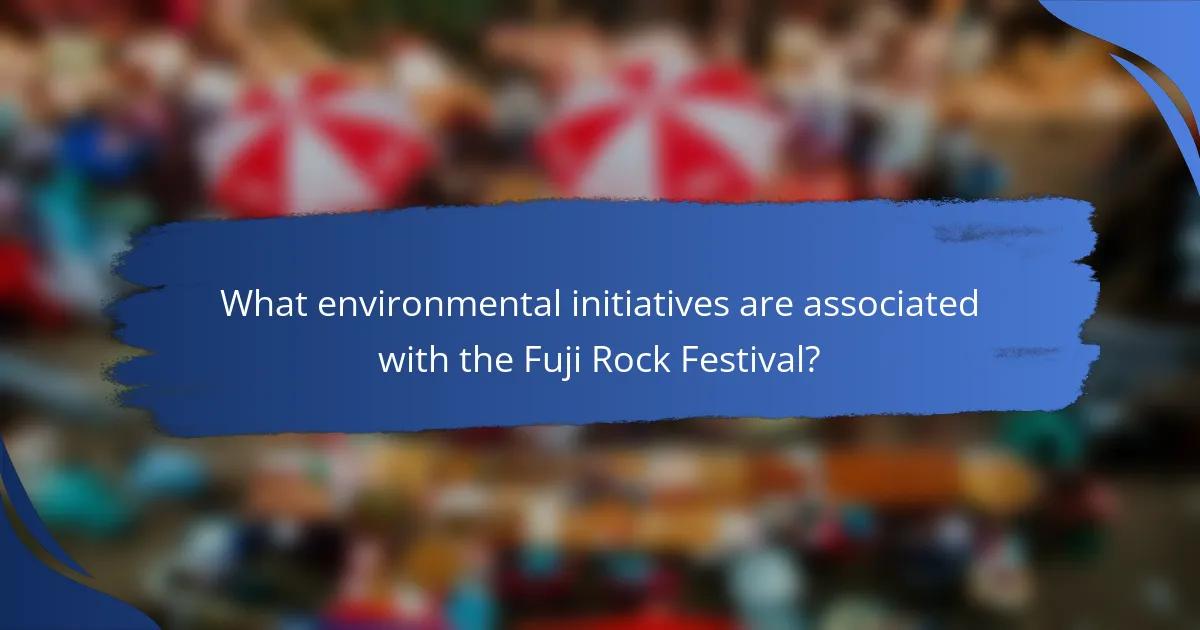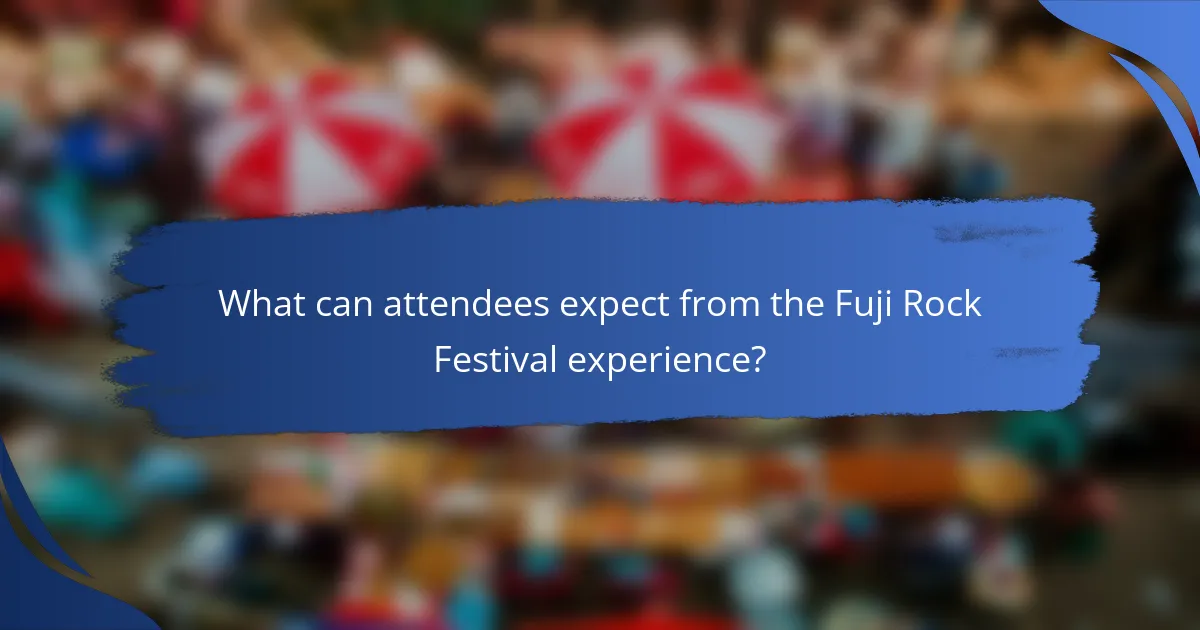The Fuji Rock Festival is a prominent annual music event held in Niigata Prefecture, Japan, known for its promotion of cultural exchange and environmental awareness. Featuring a diverse lineup of international artists, the festival takes place in a scenic mountainous setting that enhances the attendee experience while emphasizing the importance of nature. The event is committed to sustainability through various initiatives, including waste reduction, recycling, and tree-planting programs. Attendees enjoy a vibrant atmosphere with a mix of music, local and international cuisine, and workshops focused on eco-consciousness, fostering a community dedicated to ecological stewardship.

What is the significance of the Fuji Rock Festival?
The Fuji Rock Festival is significant as a major music event that promotes cultural exchange and environmental awareness. Held annually in Japan, it features a diverse lineup of international artists. The festival takes place in a stunning natural setting, nestled in the mountains of Niigata Prefecture. This location enhances the experience for attendees and highlights the importance of nature. Additionally, the festival emphasizes sustainability through various environmental initiatives. For instance, it promotes recycling and eco-friendly practices among attendees. The Fuji Rock Festival has become a symbol of the intersection between music, culture, and environmental responsibility. Its influence extends beyond entertainment, fostering a community dedicated to ecological consciousness.
How did the Fuji Rock Festival originate and evolve?
The Fuji Rock Festival originated in 1997 at the base of Mount Fuji. It was initially held at the historic site of the 1960s music festival, the “Green Room.” The first event featured international acts like Bob Dylan and The Chemical Brothers. Over the years, the festival evolved in response to environmental concerns and the need for sustainability. In 1999, the festival relocated to Naeba Ski Resort in Niigata Prefecture. This new location allowed for better infrastructure and accessibility. The festival has since grown to include diverse genres and artists from around the world. It now emphasizes environmental initiatives, promoting recycling and eco-friendly practices. The Fuji Rock Festival has become a significant cultural event, attracting thousands of attendees annually.
What were the initial goals of the festival?
The initial goals of the Fuji Rock Festival were to promote music and environmental awareness. The festival aimed to provide a platform for international and local artists. It sought to create a unique cultural experience in a natural setting. Additionally, the festival intended to emphasize sustainability and eco-friendliness. These goals reflected the founders’ vision of combining entertainment with environmental consciousness. The festival’s inception in 1997 was rooted in these core values. Over the years, it has continued to align with these objectives. This commitment has contributed to its growth and popularity.
How has the festival changed over the years?
The Fuji Rock Festival has evolved significantly since its inception in 1997. Initially, it was a smaller event featuring local acts. Over the years, it has expanded to include international artists, attracting a global audience. Attendance has grown from approximately 8,000 in its first year to over 100,000 in recent editions. The festival’s location in a natural setting has remained, but infrastructure has improved, enhancing the attendee experience. Environmental initiatives have also become a focus, promoting sustainability and eco-friendliness. The festival now features a wider variety of genres and activities, appealing to diverse audiences. Additionally, it has incorporated more local food and craft vendors, supporting regional businesses.
Why is the location of the Fuji Rock Festival important?
The location of the Fuji Rock Festival is important due to its stunning natural setting. It takes place in Naeba Ski Resort, surrounded by lush forests and mountains. This environment enhances the overall experience for attendees. The scenic backdrop contributes to the festival’s reputation as a premier outdoor event. Additionally, the location emphasizes the festival’s commitment to environmental initiatives. The natural surroundings encourage sustainable practices among participants and organizers. The combination of music and nature creates a unique atmosphere that attracts international acts and diverse audiences. Thus, the location plays a crucial role in defining the festival’s identity and appeal.
What natural features define the festival’s setting?
The festival’s setting is defined by its mountainous terrain and lush forests. Located in Naeba Ski Resort, the area is surrounded by the stunning peaks of the Japanese Alps. The dense greenery provides a natural amphitheater for performances. Additionally, the region features numerous rivers and streams that enhance the scenic beauty. The climate is characterized by cool temperatures and frequent rainfall, contributing to the vibrant vegetation. These natural elements create a unique atmosphere that attracts attendees from around the world. The combination of mountains and forests supports diverse wildlife, enriching the festival experience.
How does the environment enhance the festival experience?
The environment enhances the festival experience by providing a unique and immersive natural backdrop. The Fuji Rock Festival is set in a lush mountainous area, surrounded by forests and rivers. This scenic beauty creates a tranquil atmosphere that contrasts with urban life. Natural elements contribute to the festival’s ambiance, influencing attendees’ mood positively. Studies show that nature reduces stress and enhances enjoyment. Additionally, the outdoor setting allows for diverse activities, such as hiking and yoga, enriching the overall experience. The environment also fosters a sense of community among festival-goers, as they share in the appreciation of nature together.
What role do international acts play in the festival’s significance?
International acts enhance the significance of the Fuji Rock Festival by attracting diverse audiences. Their presence increases the festival’s global appeal. This attracts music lovers from various countries. International acts often bring unique musical styles and cultural influences. The festival features renowned artists from multiple genres, which elevates its status in the music industry. For instance, past performances included internationally acclaimed bands like Radiohead and Beck. These acts draw media attention, further promoting the festival. The inclusion of international acts fosters cultural exchange among attendees. Overall, their role is crucial in establishing the festival as a prominent global music event.
Which notable international artists have performed at the festival?
Notable international artists who have performed at the Fuji Rock Festival include Radiohead, Beck, and N.E.R.D. Radiohead headlined the festival in 2003 and 2016. Beck brought his unique sound to the stage in 2019. N.E.R.D performed at the festival in 2018, showcasing their energetic style. Other notable acts include Red Hot Chili Peppers and The Cure. These artists contribute to the festival’s reputation for attracting top global talent. The festival’s diverse lineup enhances its cultural significance and appeal.
How does the diversity of acts contribute to the festival’s appeal?
The diversity of acts enhances the festival’s appeal by attracting a broader audience. A varied lineup caters to different musical tastes and preferences. This inclusivity encourages attendees from various backgrounds to participate. Additionally, diverse performances create a dynamic atmosphere that keeps the experience engaging. The presence of international acts introduces global music trends to local audiences. This exposure fosters cultural exchange and appreciation. Festivals with diverse acts often report higher attendance rates, indicating their popularity. For example, Fuji Rock Festival features artists from multiple genres, enhancing its reputation as a premier music event.

What environmental initiatives are associated with the Fuji Rock Festival?
The Fuji Rock Festival is associated with several environmental initiatives aimed at sustainability. These initiatives include waste reduction strategies, such as encouraging recycling and composting at the event. The festival promotes the use of public transportation to reduce carbon emissions. It also features a tree-planting program, contributing to reforestation efforts in the region. Additionally, the festival collaborates with local environmental organizations to enhance conservation awareness. These practices demonstrate the festival’s commitment to environmental stewardship and community engagement.
How does the festival promote sustainability?
The festival promotes sustainability through various environmental initiatives. It implements waste reduction strategies, including recycling and composting stations. The festival encourages the use of public transportation to minimize carbon emissions. It also features eco-friendly vendors that prioritize sustainable products. Additionally, the festival incorporates renewable energy sources, such as solar power, to reduce its ecological footprint. These measures reflect a commitment to environmental stewardship. The festival’s efforts are recognized by organizations that monitor sustainability practices in large events.
What specific practices are implemented to reduce environmental impact?
Fuji Rock Festival implements several specific practices to reduce environmental impact. These practices include waste management strategies such as recycling and composting. The festival encourages attendees to use public transportation to minimize carbon emissions. Additionally, it promotes the use of biodegradable materials for food packaging. The festival also plants trees and supports local conservation efforts. Solar power is utilized for energy needs during the event. Water conservation measures are in place, including water refill stations. These initiatives collectively contribute to a more sustainable festival experience.
How does the festival engage attendees in environmental awareness?
The festival engages attendees in environmental awareness through various initiatives and activities. It incorporates workshops focused on sustainability practices. Attendees participate in discussions about climate change and conservation. The festival promotes recycling and waste reduction through clearly marked bins. Local and organic food vendors are featured to encourage sustainable eating. Art installations often highlight environmental themes, raising awareness creatively. Educational booths provide information on ecological issues and solutions. The festival’s commitment to preserving its natural surroundings reinforces its environmental message. These efforts collectively foster a culture of environmental consciousness among attendees.
Why are environmental initiatives crucial for music festivals?
Environmental initiatives are crucial for music festivals to promote sustainability and minimize ecological impact. Festivals often generate significant waste and carbon emissions. Implementing recycling programs reduces landfill contributions. Energy-efficient practices lower carbon footprints. Conservation efforts protect local ecosystems during events. Public awareness campaigns educate attendees on environmental responsibility. According to a 2020 report by the International Music Summit, 75% of festival-goers prefer events with strong sustainability practices. This demonstrates that environmental initiatives can enhance attendee experience and loyalty.
What challenges do festivals face in implementing green practices?
Festivals face several challenges in implementing green practices. First, logistical issues arise from waste management and recycling. Many festivals produce significant waste, making it difficult to ensure proper disposal and recycling. Second, financial constraints often limit the ability to invest in sustainable technologies. Implementing green initiatives can require upfront costs that may not be feasible for all festivals. Third, participant engagement is crucial yet challenging. Attendees may not be fully committed to sustainability efforts, leading to low participation in recycling or waste reduction programs. Additionally, regulatory compliance can pose obstacles. Festivals must navigate local environmental regulations, which can vary widely and complicate green initiatives. Finally, the lack of industry standards for sustainability creates confusion. Without clear guidelines, festivals may struggle to implement effective green practices consistently.
How can other festivals learn from the Fuji Rock Festival’s initiatives?
Other festivals can learn from the Fuji Rock Festival’s initiatives by adopting sustainable practices and prioritizing environmental responsibility. The festival emphasizes waste reduction, utilizing recycling and composting systems. This approach significantly lowers its ecological footprint. Additionally, Fuji Rock promotes local food vendors, supporting regional agriculture and reducing transportation emissions. The festival also integrates renewable energy sources, showcasing solar and wind power in operations. These strategies demonstrate a commitment to sustainability that other festivals can emulate. By implementing similar initiatives, festivals can enhance their environmental impact and attract eco-conscious attendees.

What can attendees expect from the Fuji Rock Festival experience?
Attendees can expect a unique blend of music, nature, and culture at the Fuji Rock Festival. The festival features performances from international acts across various genres. It takes place in a stunning natural setting, surrounded by mountains and lush forests. Attendees enjoy a diverse range of food and drink options, showcasing local and international cuisine. The festival emphasizes sustainability through various environmental initiatives. Participants can engage in workshops and activities focused on eco-awareness. The overall atmosphere is vibrant and communal, fostering connections among music lovers. Fuji Rock Festival also promotes local artisans and crafts, enhancing the cultural experience.
How can attendees prepare for the festival?
Attendees can prepare for the festival by planning their travel and accommodations in advance. They should book transportation to Naeba Ski Resort early, as options may fill up quickly. It’s advisable to check the festival’s official website for updates on schedules and lineups. Attendees should also pack appropriate clothing for varying weather conditions, including rain gear and warm layers. Bringing essentials such as sunscreen, reusable water bottles, and portable chargers is important for comfort. Familiarizing themselves with the festival map and layout can enhance their experience. Researching the lineup can help attendees prioritize performances they want to see. Lastly, attendees should consider eco-friendly practices, such as minimizing waste and using public transport, to align with the festival’s environmental initiatives.
What are the essential items to bring for a comfortable experience?
Essential items for a comfortable experience at the Fuji Rock Festival include a waterproof tent, comfortable footwear, and layered clothing. A waterproof tent protects against rain and provides a dry sleeping area. Comfortable footwear is crucial for walking on uneven terrain and standing for long periods. Layered clothing allows for adjustments to changing weather conditions. Additionally, bringing a portable charger ensures devices remain powered for communication and navigation. A refillable water bottle helps stay hydrated throughout the event. Sunscreen protects against sun exposure, while a first aid kit addresses minor injuries. These items contribute to an enjoyable festival experience.
How should attendees plan their schedule for performances?
Attendees should plan their schedule for performances by prioritizing their must-see acts. They can review the festival lineup and set a list of preferred performances. Next, attendees should consider performance times and venue locations. This helps in minimizing travel time between stages. They should also allow for breaks to rest and hydrate. Checking for potential overlaps in performance times is essential. Attendees can use festival apps for real-time updates and notifications. Lastly, being flexible with their schedule can enhance their experience, allowing for spontaneous discoveries.
What tips can enhance the overall festival experience?
Arriving early enhances the overall festival experience. Early arrival allows for better parking options and less crowded entrances. It provides time to explore the festival grounds before events begin. Familiarizing oneself with the layout can prevent confusion later. Staying hydrated is essential during long festival days. Drinking plenty of water keeps energy levels up and prevents fatigue. Dressing in layers prepares attendees for changing weather conditions. Comfortable footwear is crucial for walking and standing throughout the event. Engaging with local vendors supports the community and enriches the experience. Lastly, planning ahead by checking the schedule ensures no favorite acts are missed.
How can attendees make the most of the natural setting?
Attendees can make the most of the natural setting by engaging in outdoor activities and appreciating the scenery. Hiking trails around the festival site offer stunning views of the mountains. Participants should explore the lush forests and diverse wildlife. Utilizing designated areas for relaxation enhances the experience. Attendees can also participate in workshops that connect them with nature. Embracing eco-friendly practices, such as reducing waste, contributes to environmental sustainability. The festival’s layout encourages interaction with the natural environment. This immersive experience enriches attendees’ overall enjoyment of the event.
What are the best practices for engaging with the festival’s community?
Best practices for engaging with the festival’s community include fostering open communication and providing platforms for feedback. Organizing interactive activities enhances participation and builds relationships. Utilizing social media to share updates and stories keeps the community informed and connected. Collaborating with local artists and businesses strengthens community ties and promotes regional culture. Hosting workshops or panels allows for knowledge sharing and deeper engagement. Regularly acknowledging community contributions shows appreciation and encourages ongoing involvement. These practices have been shown to increase community satisfaction and loyalty, as evidenced by successful festivals that prioritize participant interaction.
The Fuji Rock Festival is a prominent music event in Japan that emphasizes cultural exchange and environmental sustainability. Set in the picturesque Naeba Ski Resort, it features a diverse lineup of international artists, promoting a unique blend of music and nature. The festival has evolved since its inception in 1997, incorporating various environmental initiatives aimed at reducing its ecological footprint. Attendees can expect a vibrant atmosphere enriched by local food, workshops on sustainability, and opportunities to engage with the natural surroundings, making it a significant cultural and ecological gathering.